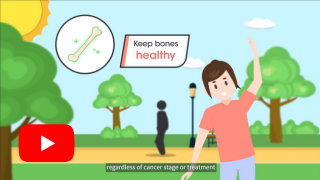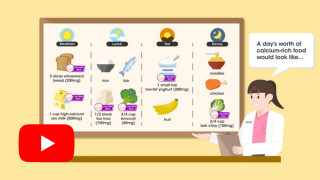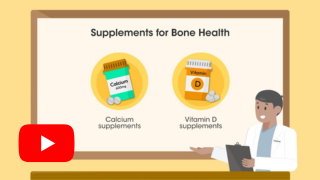National Cancer Centre Singapore will NEVER ask you to transfer money over a call. If in doubt, call the 24/7 ScamShield helpline at 1799, or visit the ScamShield website at www.scamshield.gov.sg.
Bone Problems
- Allergies
- Appetite Loss
- Bone Problems
- Breathing Problems
- Constipation
- Diarrhoea
- Difficulty Swallowing (Dysphagia)
- Dry Mouth (Xerostomia)
- Difficulty Sleeping (Insomnia)
- Feeling Tired (Fatigue)
- Fevers and Infections
- Hair Loss
- Heart Problems
- Menopausal Symptoms
- Indigestion
- Joint Pains
- Limb Swelling (Lymphedema)
- Muscle Aches
- Nail Changes
- Nausea and Vomiting
- Pain
- Tingling or Numbness in Hands or Feet (Peripheral Neuropathy)
- Skin Changes
- Sore Mouth (Oral Mucositis)
- Taste Changes

Bone loss is a natural part of aging, but certain cancer treatments, like therapies or procedures that affect hormone production, can speed up bone loss and lead to osteoporosis. Some cancers can also spread to the bones, increasing the risk of complications such as fractures, spinal cord compression or pain.
Effective treatments are available to manage bone health and reduce these risks.
Signs of Bone Loss
- Bone pain or tenderness from fracture or bone metastases
- Loss of height or stooped posture due to collapsed spinal bones
- Difficulties walking or moving around
- Weakness or numbness if the spine is affected
If you experience any bone or joint pain, seek medical attention immediately. Your doctor will conduct investigations to determine and treat the cause of pain, as well as prescribe you with medications to reduce the pain.
Protecting Your Bones
Your healthcare team will assess your bone health and may recommend:
- Bone-Targeted Agents (Bisphosphonates or Denosumab) to slow down osteoporosis and treat or prevent bone-related complications
- Radiation Therapy to treat bone metastases and relieve bone pain
- Calcium supplements to maintain bone strength, and Vitamin D supplements to help with calcium absorption
- Imaging scans (e.g. Bone density tests or CT scans) to monitor the amount of bone tissue you have, or assess how well your treatment is working
What You Can Do
- Follow a well-balanced diet that is rich in calcium (low fat dairy products, green leafy vegetables, calcium-rich foods like sardines, almonds, beans) and vitamin D (egg yolks, tuna, salmon, liver).
- Aim for at least 30 minutes of physical activity, 5 days a week. Weight bearing exercises such climbing stairs, dancing and walking are useful to build muscle strength and bone mass, which in turn reduces the risk of falls and fractures.
- Take special caution to prevent falls and injuries. Wear non-skid footwear and fitting non-slip shoes. Clear clutter in your home to prevent tripping over them, keep floors dry and use anti-slip mats.
- Avoid smoking and reduce alcohol/caffeine consumption as they can affect calcium absorption and contribute to bone loss.

When to call your cancer care team
Please seek immediate medical attention if you experience any of the following:
- Sudden, severe pain
- New or severe neck or back pain, with:
- Upper or lower body weakness
- Loss of bladder or bowel control
If you have any questions regarding the above, please call the Cancer Helpline at +65 6225 5655 or approach your doctor or nurse for further details.
The above contents are made available as part of TEMASEK FOUNDATION-ACCESS (Accessible Cancer Care to Enable Support for Survivors) PROGRAMME, a holistic care programme to support cancer patients during their care and recovery journey.
The contents have been approved by the Cancer Education Information Service, National Cancer Centre Singapore (NCCS), for people with cancer and their families and caregivers. However, this information serves only as a guide and should not be used as a substitute for medical diagnosis, treatment or advice. For specific medical conditions, please seek expert medical advice from your healthcare team.
Brought to you by:
![]()
![]()
Keep Healthy With
© 2025 SingHealth Group. All Rights Reserved.



















